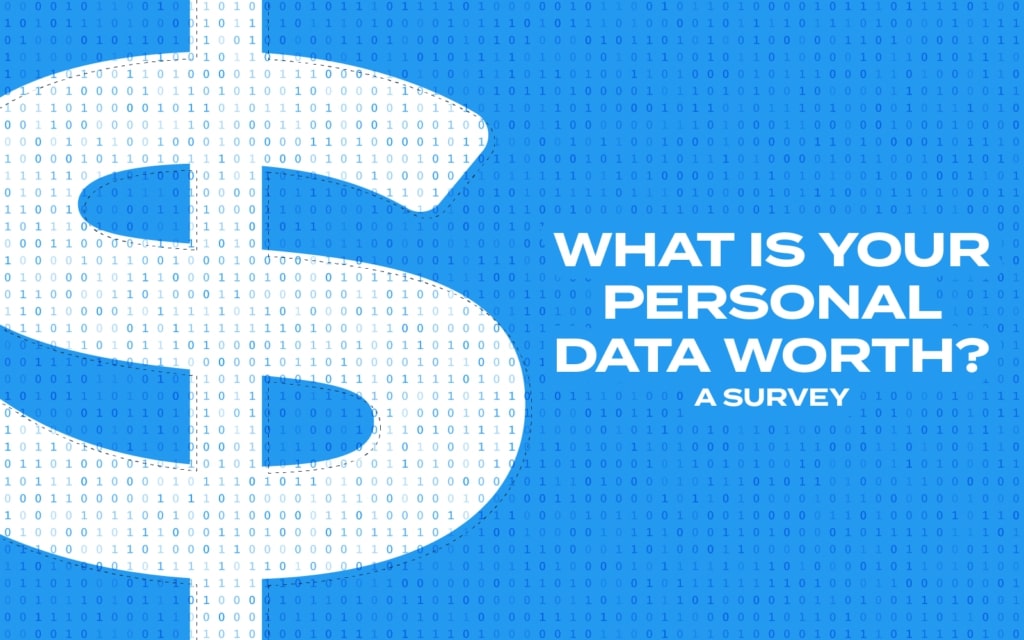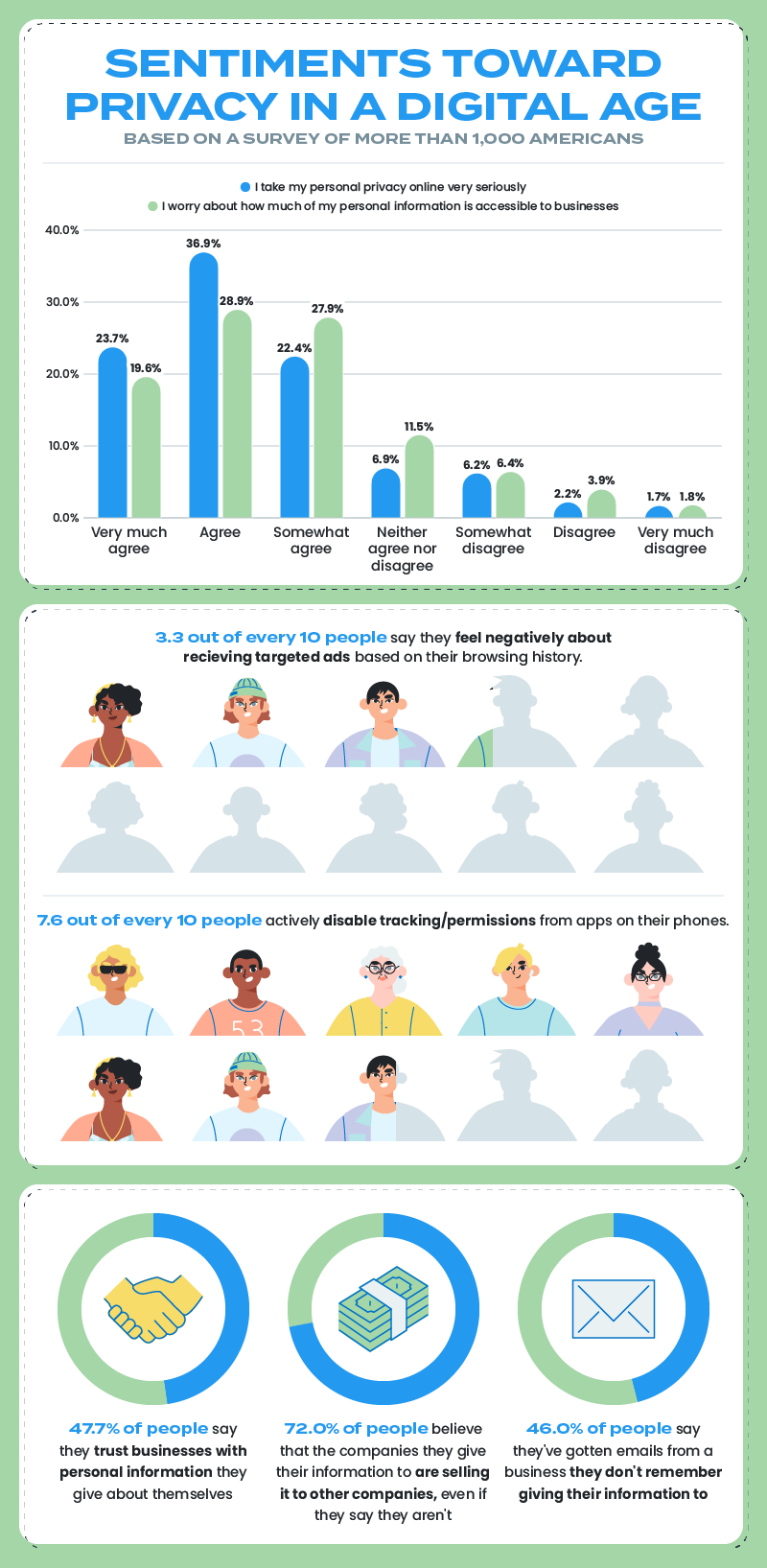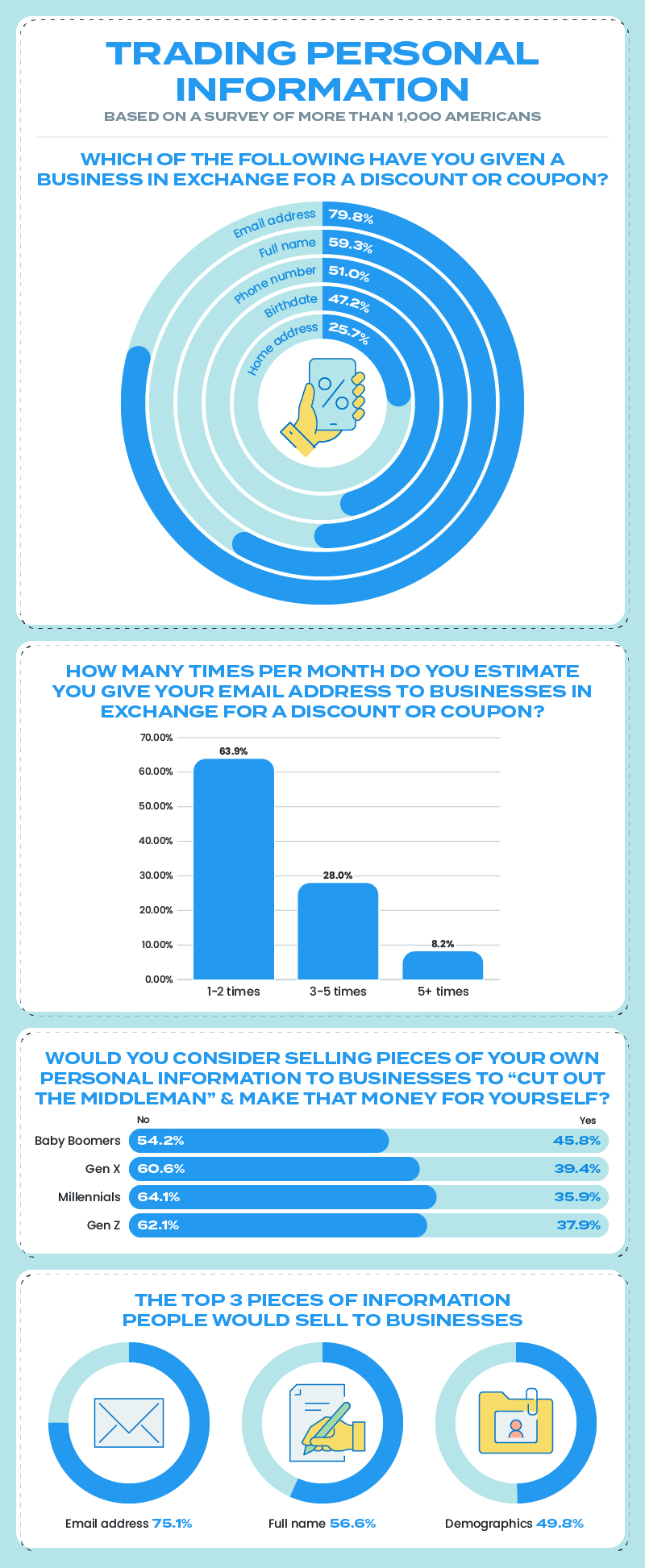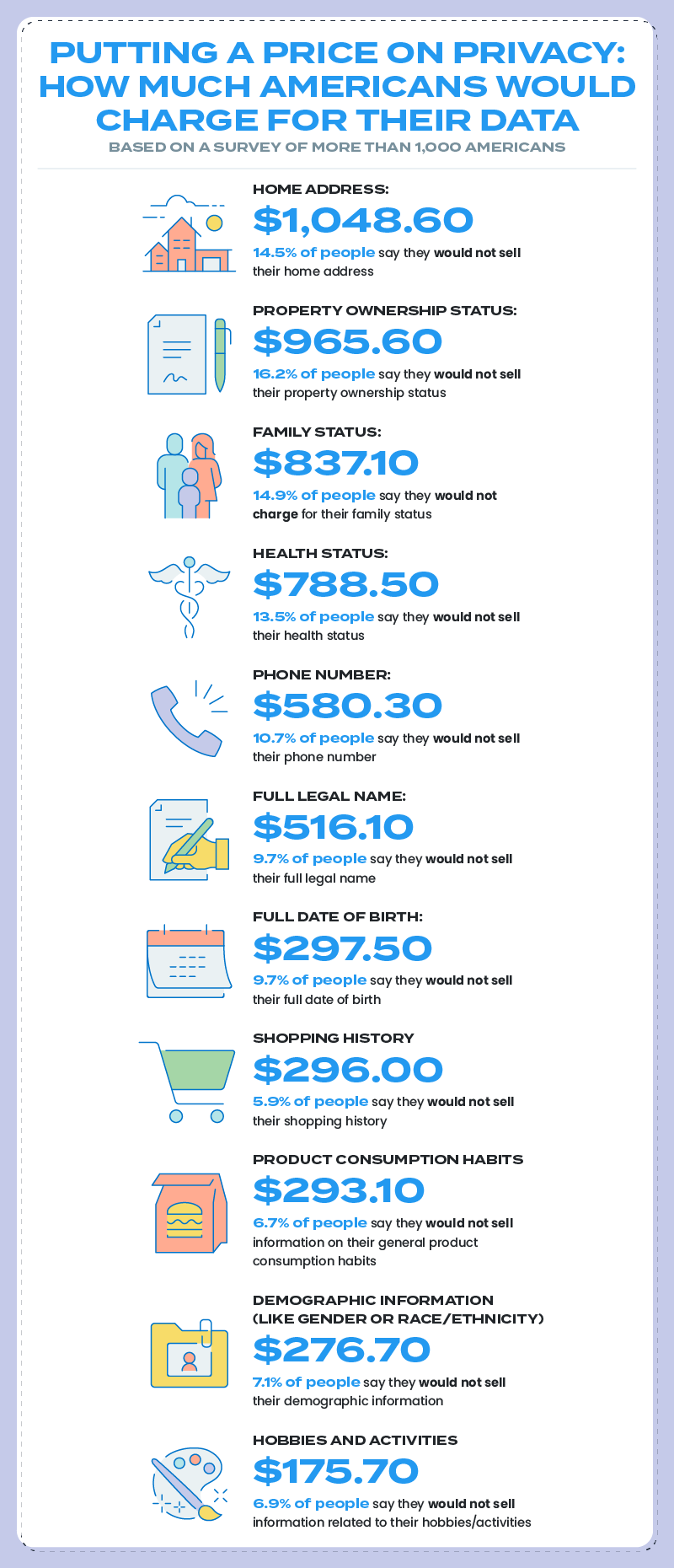What Is your Personal Data Worth? A Survey
How valuable is your personal information? We ran a digital privacy survey to learn how much Americans would charge for their personal data.

How valuable is your personal information? We ran a digital privacy survey to learn how much Americans would charge for their personal data.

With smartphones giving us turn-by-turn directions, streaming apps offering up curated movie suggestions, and personalized ads making us aware of our favorite products, modern daily life is inundated with conveniences made possible by technology. We never get lost, we remain close with loved ones from afar, and we don’t even have to remember our credit card numbers anymore. It’s a pretty sweet deal.
The catch is that we pay for these luxuries with personal data. This trade-off between data and services is evidently worth it for millions of tech users, but not everyone is as eager to share their personal details with companies at large. This posed the question: How important is online privacy to the average American? We had to find out.
We surveyed more than 1,000 Americans to find out how the general public feels about handing out their personal data and what they would charge for it in a hypothetical situation where they were able to cut out the middleman and sell it to businesses themselves. Read on to see what we found!

According to survey respondents, online privacy is no laughing matter. 36.9% agreed they take their online privacy very seriously while 23.7% very much agreed and 22.4% somewhat agreed to the same sentiment. In all, 83% were inclined to say they take online privacy very seriously.
A huge component to online privacy in today’s landscape of targeted marketing is the amount of personal data available and who has access to it. To that end, more than 3 in 4 respondents agreed that not knowing how much data companies have access to is a cause for concern.
Sure, consumers might not mind having their web history and search queries scrutinized in return for personalized ads that reveal new products from the brands they love. But beyond marketing, mapping, and social networking, many consumers are concerned about their data falling into the hands of less scrupulous companies like data brokers—businesses that analyze and sell your information without your knowledge or compensation.
This concern is being slowly eroded by time, however. According to our analysis, Baby Boomers were the most likely to say they’re worried about how much of their personal information is accessible to businesses (81%) while Gen Z was the least likely (69%). Whether this is due to higher levels of dependence on products and services that mine our data, or ignorance about the kinds and volumes of data collected, we can’t be sure.
What we do know is that most Americans are ok with forfeiting their browsing history and search queries in return for targeted ads. More precisely, just 3 out of 10 respondents felt negatively about this practice. It was tracking tactics used by mobile apps and devices where Americans drew the line. Three in four Americans admitted to disabling these features.
When it comes to trusting the businesses that collect their information, Americans are split pretty evenly. Men (48.7%) were slightly more likely than women (46.9%) to trust businesses with their information. Gen X trusts businesses the most with their personal information (53.8%) while Gen Z trusts them the least (33%).
What’s more, 72% of people believe that the companies we give our information to are selling that information to other companies, even if they say they aren’t. Baby Boomers were again the most skeptical (77%) and Gen Z was the most trusting generation 65%).
While many companies like SimpleTexting use customer data in an honest and honorable way, consumers’ concern is not entirely surprising. Examples like the Cambridge Analytica scandal—where Cambridge Analytica acquired the personal data of tens of millions of facebook users to sell to political campaigns—have tarnished consumer trust in a business’ ability to handle its data responsibly. This makes it more important than ever to responsibly store and use consumer data and earn back their trust.
Sometimes, tech users feel that shady data collection practices hit too close to home. According to our results 46% of people have received emails from a business they don’t remember giving their information to. This phenomenon is much less apparent with younger generations. Just over 1 in 10 Millennials have gotten snail mail from a business they don’t remember giving their information to.
It’s clear that consumers take their privacy seriously and feel that much is at stake when searching the web. But the modern conveniences we depend on make it a fool’s errand to keep all of our private information from the our favorite companies we interact with on a daily basis. So we dug into the kinds of data consumers are willing to trade for a discount or a coupon.

Respondents went for low-hanging fruit with 80% agreeing to trade their email for a discount or coupon. With highly competent spam filters accompanying most modern inboxes, there isn’t much of a downside to giving away an email address. In fact, nearly two-thirds of respondents give their email to businesses once or twice per month and another 29% do so three to five times per month.
The second most common piece of information respondents are likely to trade is their full name (60%). Considering we dole out our names to baristas at our favorite cafe’s, this is hardly a sacrifice either. Phone numbers (51%) and birthdates (47%) took second and third place. Respondents mainly played keep away with their home address, with just one in four respondents willing to trade it for a discount or coupon.
But what if consumers could sell their own information? What would they be willing to trade? We found that in a world where everyone has the power to sell their own data for personal profit, 62.6% would consider it. More specifically, younger generations that have spent the majority of their lives in the data boom—like millennials and Gen Z—are more likely to do so than older generations—like Gen X and Baby Boomers.
Of those who would sell their information for personal profit, their email address (75.1%), full name (56.6%), and demographic information like age or race (49.8%) were the most likely pieces of information they’d put on the market. Read on to see how much they’d charge for the rights to peek into their private digital world.

When it comes to the monetary value respondents put on their personal data, the results were shocking. Home addresses are still the most sacred, with respondents valuing them at $1,040.00 on average! Property ownership status was a close second with respondents charging an average of $965.60 for that information. Additionally, 14.5% said their home address is priceless with no amount of money convincing them to sell.
On the other hand, people weren’t too invested in hiding their product consumption habits, demographics, or hobbies and activities, valuing them at $293.10, $276.70, and $175.70 respectively. These lower valuations suggest that consumers are more comfortable with usage of personal data for advertising purposes. After all, we all love to be informed on our favorite brands and products, but no one wants their health conditions or the location of their home to fall into the wrong hands.
Data as currency is still a relatively new concept to the business landscape and we’re still feeling it out as a society. While we believe most companies act with integrity when it comes to usage of personal data, there are undeniably malefactors out there. This can make the internet a scary place for Americans who wish to protect their privacy.
Still, text marketing is a cheap and efficient strategy to reach consumers on their phones, where they already spend so much of their time. We just have to do it in a transparent way that builds brand trust with our customers. If you’re looking to start a text marketing initiative and want to learn how to do it the right way, start with our ultimate guide to SMS marketing.
Drew Wilkinson is the Head of Marketing at SimpleTexting. Drew has more than a decade of experience managing successful integrated marketing programs to build brands, raise awareness, and generate demand.
More Posts from Drew WilkinsonAuto repair marketing isn't limited to traditional media. Learn how to set your shop apart with seven marketing strategies you can begin employing right now.
ReadCall routing is a call management feature used to place incoming calls in a queue. Learn about call routing and how it can optimize customer contact.
ReadStart a text marketing campaign or have a 1-on-1 conversation today. It's risk free. Sign up for a free 14-day trial today to see SimpleTexting in action.
No credit card required